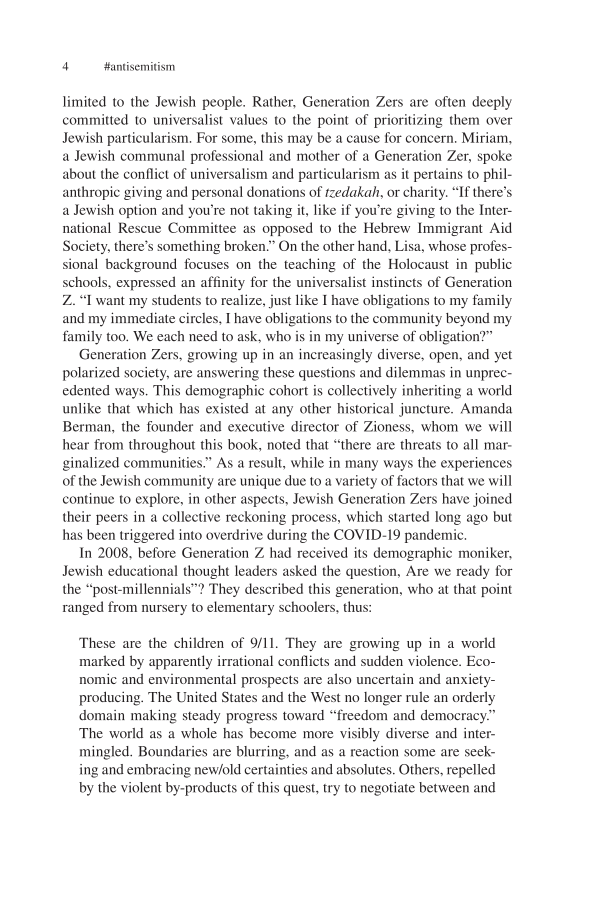4 #antisemitism limited to the Jewish people. Rather, Generation Zers are often deeply committed to universalist values to the point of prioritizing them over Jewish particularism. For some, this may be a cause for concern. Miriam, a Jewish communal professional and mother of a Generation Zer, spoke about the conflict of universalism and particularism as it pertains to phil- anthropic giving and personal donations of tzedakah, or charity. “If there’s a Jewish option and you’re not taking it, like if you’re giving to the Inter- national Rescue Committee as opposed to the Hebrew Immigrant Aid Society, there’s something broken.” On the other hand, Lisa, whose profes- sional background focuses on the teaching of the Holocaust in public schools, expressed an affinity for the universalist instincts of Generation Z. “I want my students to realize, just like I have obligations to my family and my immediate circles, I have obligations to the community beyond my family too. We each need to ask, who is in my universe of obligation?” Generation Zers, growing up in an increasingly diverse, open, and yet polarized society, are answering these questions and dilemmas in unprec- edented ways. This demographic cohort is collectively inheriting a world unlike that which has existed at any other historical juncture. Amanda Berman, the founder and executive director of Zioness, whom we will hear from throughout this book, noted that “there are threats to all mar- ginalized communities.” As a result, while in many ways the experiences of the Jewish community are unique due to a variety of factors that we will continue to explore, in other aspects, Jewish Generation Zers have joined their peers in a collective reckoning process, which started long ago but has been triggered into overdrive during the COVID-19 pandemic. In 2008, before Generation Z had received its demographic moniker, Jewish educational thought leaders asked the question, Are we ready for the “post-millennials”? They described this generation, who at that point ranged from nursery to elementary schoolers, thus: These are the children of 9/11. They are growing up in a world marked by apparently irrational conflicts and sudden violence. Eco- nomic and environmental prospects are also uncertain and anxiety- producing. The United States and the West no longer rule an orderly domain making steady progress toward “freedom and democracy.” The world as a whole has become more visibly diverse and inter- mingled. Boundaries are blurring, and as a reaction some are seek- ing and embracing new/old certainties and absolutes. Others, repelled by the violent by-products of this quest, try to negotiate between and
Document Details My Account Print multiple pages
Print
You have printed 0 times in the last 24 hours.
Your print count will reset on at .
You may print 0 more time(s) before then.
You may print a maximum of 0 pages at a time.

































































































































































































